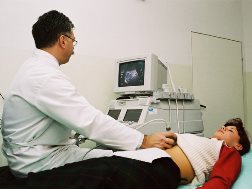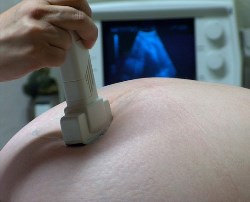How to Choose the Right Ultrasound Technician Training Program near Crucible Pennsylvania
 Now that you have decided to obtain an ultrasound technician degree near Crucible PA, the next step is to begin the process of selecting a college. To begin with, you must find the ideal program that will furnish the appropriate education to become a qualified professional. And since some states do require that sonographers be either certified or licensed, depending on where you will practice you may also need to be prepared to pass a certification or licensing examination. So it’s extremely important that you research each program so that you can evaluate and compare your options. But just where does one begin? Most students will begin by searching for schools that are within driving distance of their residences and then by comparing tuition. Certainly cost and location need to be considered when making a decision, but there are additional critical factors also. Such as, if the ultrasound technician schools are accredited or if they offer internships. These and other qualifications will be discussed more in depth later in this article. But first, let’s discuss what an ultrasound tech does and the degrees and online training programs that are available.
Now that you have decided to obtain an ultrasound technician degree near Crucible PA, the next step is to begin the process of selecting a college. To begin with, you must find the ideal program that will furnish the appropriate education to become a qualified professional. And since some states do require that sonographers be either certified or licensed, depending on where you will practice you may also need to be prepared to pass a certification or licensing examination. So it’s extremely important that you research each program so that you can evaluate and compare your options. But just where does one begin? Most students will begin by searching for schools that are within driving distance of their residences and then by comparing tuition. Certainly cost and location need to be considered when making a decision, but there are additional critical factors also. Such as, if the ultrasound technician schools are accredited or if they offer internships. These and other qualifications will be discussed more in depth later in this article. But first, let’s discuss what an ultrasound tech does and the degrees and online training programs that are available.
Sonogram Tech Job Summary
 There are multiple professional titles for ultrasound techs (technicians). They are also referred to as ultrasound technologists, sonogram techs, and diagnostic medical sonographers (or just sonographers). Regardless of name, they all have the same basic job description, which is to carry out diagnostic ultrasound procedures on patients. Although a number of techs work as generalists there are specialties within the profession, for instance in cardiology and pediatrics. Most practice in Crucible PA hospitals, clinics, outpatient diagnostic imaging centers and even private practices. Typical daily job functions of an ultrasound tech may consist of:
There are multiple professional titles for ultrasound techs (technicians). They are also referred to as ultrasound technologists, sonogram techs, and diagnostic medical sonographers (or just sonographers). Regardless of name, they all have the same basic job description, which is to carry out diagnostic ultrasound procedures on patients. Although a number of techs work as generalists there are specialties within the profession, for instance in cardiology and pediatrics. Most practice in Crucible PA hospitals, clinics, outpatient diagnostic imaging centers and even private practices. Typical daily job functions of an ultrasound tech may consist of:
- Preserving records of patient medical histories and details of each procedure
- Counseling patients by explaining the procedures and answering questions
- Readying the ultrasound machines for testing and then sterilizing and re-calibrating them
- Transferring patients to treatment rooms and ensuring their comfort
- Operating equipment while limiting patient exposure to sound waves
- Evaluating results and determining necessity for supplemental testing
Ultrasound techs must frequently assess the performance and safety of their machines. They also are held to a high professional standard and code of conduct as health practitioners. In order to sustain that level of professionalism and stay current with medical knowledge, they are required to complete continuing education training on a regular basis.
Ultrasound Technician Degrees Offered
 Sonogram tech enrollees have the opportunity to earn either an Associate Degree or a Bachelor’s Degree. An Associate Degree will typically take around 18 months to 2 years to complete based upon the program and class load. A Bachelor’s Degree will take longer at as long as 4 years to finish. Another alternative for individuals who have already obtained a college degree is a post graduate certificate program. If you have received a Bachelor’s Degree in any major or an Associate Degree in a related health sector, you can instead choose a certificate program that will require only 12 to 18 months to complete. Something to keep in mind is that the majority of sonographer schools do have a practical training component as part of their course of study. It often may be satisfied by entering into an internship program which many schools organize through Crucible PA hospitals and clinics. When you have graduated from one of the certificate or degree programs, you will then have to comply with the certification or licensing requirements in Pennsylvania or whichever state you choose to work in.
Sonogram tech enrollees have the opportunity to earn either an Associate Degree or a Bachelor’s Degree. An Associate Degree will typically take around 18 months to 2 years to complete based upon the program and class load. A Bachelor’s Degree will take longer at as long as 4 years to finish. Another alternative for individuals who have already obtained a college degree is a post graduate certificate program. If you have received a Bachelor’s Degree in any major or an Associate Degree in a related health sector, you can instead choose a certificate program that will require only 12 to 18 months to complete. Something to keep in mind is that the majority of sonographer schools do have a practical training component as part of their course of study. It often may be satisfied by entering into an internship program which many schools organize through Crucible PA hospitals and clinics. When you have graduated from one of the certificate or degree programs, you will then have to comply with the certification or licensing requirements in Pennsylvania or whichever state you choose to work in.
Ultrasound Tech Online Classes
 As earlier discussed, almost all sonogram technician colleges have a clinical component to their programs. So while you can receive a degree or certificate online, a substantial part of the training will be either held in an on campus laboratory or at an authorized off-campus medical care provider. Clinical training can often be satisfied by means of an internship at a local Crucible PA outpatient clinic, hospital or family practice. However the balance of the classes and training may be attended online in your Crucible home. This is especially convenient for those students that continue working while getting their degrees. Plus online programs are many times more affordable than on campus alternatives. Expenses for commuting and study materials can be decreased also. But similarly as with any sonographer program you are considering, verify that the online program you select is accredited. Among the most highly regarded accrediting agencies is the Commission on Accreditation of Allied Health Education Programs (CAAHEP). Accreditation is particularly significant for certification, licensing and finding employment (more on accreditation later). So if you are dedicated enough to learn away from the classroom in the comfort of your own home, then an online degree could be the ideal option for you.
As earlier discussed, almost all sonogram technician colleges have a clinical component to their programs. So while you can receive a degree or certificate online, a substantial part of the training will be either held in an on campus laboratory or at an authorized off-campus medical care provider. Clinical training can often be satisfied by means of an internship at a local Crucible PA outpatient clinic, hospital or family practice. However the balance of the classes and training may be attended online in your Crucible home. This is especially convenient for those students that continue working while getting their degrees. Plus online programs are many times more affordable than on campus alternatives. Expenses for commuting and study materials can be decreased also. But similarly as with any sonographer program you are considering, verify that the online program you select is accredited. Among the most highly regarded accrediting agencies is the Commission on Accreditation of Allied Health Education Programs (CAAHEP). Accreditation is particularly significant for certification, licensing and finding employment (more on accreditation later). So if you are dedicated enough to learn away from the classroom in the comfort of your own home, then an online degree could be the ideal option for you.
Topics to Ask Ultrasound Tech Colleges
 After you have decided on the type of degree or certificate that you would like to obtain, you can start the procedure of evaluating and comparing ultrasound tech schools. You will first probably want to decide whether you would rather attend classes online or travel to a school campus in the Crucible PA area. Certainly location will be important if you decide on the latter, and the price of tuition no doubt will be an initial qualifier as well. But there are additional variables that you must also take into account, for instance if the colleges are accredited and if they offer internships. Therefore in order to perform your due diligence so that you can make your ultimate selection, following are a few questions that you need ask each sonography program prior to making a decision.
After you have decided on the type of degree or certificate that you would like to obtain, you can start the procedure of evaluating and comparing ultrasound tech schools. You will first probably want to decide whether you would rather attend classes online or travel to a school campus in the Crucible PA area. Certainly location will be important if you decide on the latter, and the price of tuition no doubt will be an initial qualifier as well. But there are additional variables that you must also take into account, for instance if the colleges are accredited and if they offer internships. Therefore in order to perform your due diligence so that you can make your ultimate selection, following are a few questions that you need ask each sonography program prior to making a decision.
Are the Ultrasound Tech Programs Accredited? Most ultrasound tech schools have received some type of accreditation, whether national or regional. However, it’s still important to confirm that the program and school are accredited. Among the most highly respected accrediting agencies in the field of sonography is the Joint Review Committee on Education in Diagnostic Medical Sonography (JRC-DMS). Programs earning accreditation from the JRC-DMS have gone through an extensive assessment of their teachers and educational materials. If the program is online it might also receive accreditation from the Distance Education and Training Council, which targets online or distance learning. All accrediting agencies should be acknowledged by the U.S. Department of Education or the Council on Higher Education Accreditation. Along with guaranteeing a quality education, accreditation will also assist in obtaining financial aid and student loans, which are frequently not available for non-accredited programs. Accreditation may also be a pre-requisite for licensing and certification as required. And numerous Crucible PA employers will only hire graduates of an accredited program for entry-level positions.
Are Internship Programs Offered? Ask if the sonogram tech schools you are interested in have partnerships with Crucible PA clinics or hospitals for internship programs. Not only are internships an excellent means to obtain practical experience in a clinical environment, they are additionally a way to fulfill the practical training requirement for the majority of programs. As a supplemental benefit, they can help graduates and students establish professional connections in the Crucible healthcare community and assist with obtaining employment.
Is Job Placement Assistance available? You will most likely wish to secure employment quickly after graduating, but finding that initial job in a new profession can be challenging without assistance. Ask if the sonographer programs you are considering have job placement programs and what their success rates are. Rapid and high placement rates are a good sign that the schools have sizable networks and good relationships with Pennsylvania healthcare employers. It also confirms that their graduates are well regarded and in demand.
Where is the Program Located? For a number of students, the school they choose will need to be within driving distance of their Crucible PA residence. Those who have opted to attend online classes naturally will not have to worry themselves with the location of the campus. However, the availability of local internships will be of concern. Something to bear in mind is that if you decide to enroll in a school that is out of state or perhaps out of your local area, you may have to pay a higher tuition. State colleges usually charge higher tuitions for out of state residents. And community colleges generally charge a higher tuition to those students that live outside of their districts.
How Big are the Classes ? Unless you are the sort of student that prefers to sit far in the rear of the classroom or hide in the crowd, you will undoubtedly prefer a small class size. Small classes enable more individual participation and one-on-one instruction. Ask the schools you are looking at what the typical student to teacher ratio is for their classes. If practical you may prefer to sit in on one or more classes before making your ultimate determination. This will also give you an opportunity to converse with a few of the students and instructors to get their opinions regarding the sonogram tech program as well.
Can the College Accommodate your Schedule? And last you need to confirm that the ultrasound tech program you ultimately pick can offer the class schedule you need. This is especially important if you choose to continue working while attending classes. If you need to schedule evening or weekend classes in the Crucible PA area, confirm that they are offered. If you can only enroll on a part-time basis, check if that is an alternative and how many credit hours or courses you would have to enroll in. Also, find out what the protocol is for making up any classes that you might miss due to illness, work or family emergencies.
Enrolling in an Ultrasound Tech Program near Crucible PA?
If you are considering a Sonography Tech School near Crucible Pennsylvania, following is some interesting background information about the location of your new school campus.
Crucible steel
Crucible steel is steel made by melting pig iron (cast iron), iron, and sometimes steel, often along with sand, glass, ashes, and other fluxes, in a crucible. In ancient times steel and iron were impossible to melt using charcoal or coal fires, which could not produce temperatures high enough. However, pig iron, having a higher carbon content thus a lower melting point, could be melted, and by soaking wrought iron or steel in the liquid pig-iron for long periods of time, the carbon content of the pig iron could be reduced as it slowly diffused into the iron. Crucible steel of this type was produced in South and Central Asia during the medieval era. This generally produced a very hard steel, but also a composite steel that was inhomogeneous, consisting of a very high-carbon steel (formerly the pig-iron) and a lower-carbon steel (formerly the wrought iron). This often resulted in an intricate pattern when the steel was forged, filed or polished, with possibly the most well-known examples coming from the wootz steel used in Damascus swords. Due to the use of fluxes the steel was often much higher in quality (lacking impurities) and in carbon content compared to other methods of steel production of the time.
Techniques for production of high quality steel were developed by Benjamin Huntsman in England in the 18th century. Huntsman used coke rather than coal or charcoal, achieving temperatures high enough to melt steel and dissolve iron. Huntsman's process differed from some of the wootz processes in that it took a longer time to melt the steel and to cool it down and allowed more time for the diffusion of carbon.[1] Huntsman's process used iron and steel as raw materials, in the form of blister steel, rather than direct conversion from cast iron as in puddling or the later Bessemer process. The ability to fully melt the steel removed any inhomogeneities in the steel, allowing the carbon to dissolve evenly into the liquid steel and negating the prior need for extensive blacksmithing in an attempt to achieve the same result. Similarly, it allowed steel to simply be poured into molds, or cast, for the first time. The homogeneous crystal structure of this cast steel improved its strength and hardness compared to preceding forms of steel. The use of fluxes allowed nearly complete extraction of impurities from the liquid, which could then simply float to the top for removal. This produced the first steel of modern quality, providing a means of efficiently changing excess wrought iron into useful steel. Huntsman's process greatly increased the European output of quality steel suitable for use in items like knives, tools, and machinery, helping to pave the way for the Industrial revolution.
Iron alloys are most broadly divided by their carbon content: cast iron has 2-4% carbon impurities; wrought iron oxidizes away most of its carbon, to less than 0.1%. The much more valuable steel has a delicately intermediate carbon fraction, and its material properties range according to the carbon percentage: high carbon steel is stronger but more brittle than low carbon steel. Crucible steel sequesters the raw input materials from the heat source, allowing precise control of carburization (raising) or oxidation (lowering carbon content). Fluxes, such as limestone, could be added to the crucible to remove or promote sulfur, silicon, and other impurities, further altering its material qualities.
Various methods were used to produce crucible steel. According to Islamic texts such as al-Tarsusi and Abu Rayhan Biruni, three methods are described for indirect production of steel.[2] The medieval Islamic historian Abu Rayhan Biruni (c. 973–1050) provides the earliest reference of the production of Damascus steel.[3] The first, and the most common, traditional method is solid state carburization of wrought iron. This is a diffusion process in which wrought iron is packed in crucibles or a hearth with charcoal, then heated to promote diffusion of carbon into the iron to produce steel.[4] Carburization is the basis for the wootz process of steel. The second method is the decarburization of cast iron by removing carbon from the cast iron.[3] The third method uses wrought iron and cast iron. In this process, wrought iron and cast iron may be heated together in a crucible to produce steel by fusion.[4] In regard to this method Abu Rayhan Biruni states: "this was the method used in Hearth". It is proposed that the Indian method refers to Wootz carburization method;[3] i.e., the Mysore or Tamil processes.[5]
Find the Right Sonography Certificate Crucible PA
Picking the ideal sonographer degree or certificate program is an important first step to embarking on a rewarding new career delivering diagnostic services to patients. Ultrasound tech colleges require that you have earned a high school diploma or a GED. Along with satisfying academic standards, you must be in at least fairly good physical condition, capable of standing for prolonged time frames with the ability to regularly lift weights of 50 pounds or more, as is it often necessary to adjust patients and move heavy equipment. Other desirable skills include technical proficiency, the ability to remain calm when faced with an angry or anxious patient and the ability to converse in a clear and compassionate manner. You originally came to this website due to an interest in Sonography Certificate. However, as we have discussed in this article, there are several questions that you need to ask each college you are considering. This holds true whether you enroll in an online degree or travel to the school campus to attend classes. And by asking the appropriate questions so that you can compare each college, you will be able to narrow down your alternatives until you are left with the ideal program for your education. And with the right training, dedication and determination to succeed, you can accomplish your objective to practice as an ultrasound technologist in Crucible PA.
Other Ultrasound Locations in Pennsylvania

